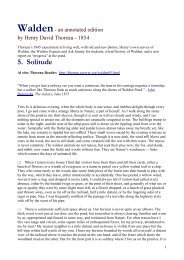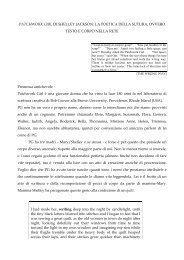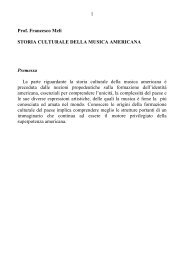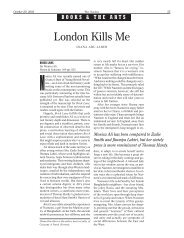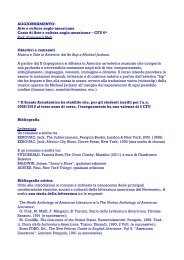Rewriting Woolf s Mrs. Dalloway: Homage, Sexual ... - Paola Carbone
Rewriting Woolf s Mrs. Dalloway: Homage, Sexual ... - Paola Carbone
Rewriting Woolf s Mrs. Dalloway: Homage, Sexual ... - Paola Carbone
Create successful ePaper yourself
Turn your PDF publications into a flip-book with our unique Google optimized e-Paper software.
There are other reasons as well for appropriating <strong>Mrs</strong>. <strong>Dalloway</strong>. First, it isconcerned with the ambiguity of sexual identity and desire, a subject that haseven greater currency within a contemporary world actively and openly exploringgender construction. Clearly, changes in public attitudes toward sexual orientationsince Wooif's time play some role in the retellings by Cunningham andLippincott. Second, <strong>Mrs</strong>. <strong>Dalloway</strong> is unique among city novels in the way inwhich <strong>Woolf</strong> establishes a network of external and internal connections betweenher urban inhabitants, making a large city like London begin to feel like a smalltown. Wooif's technique for managing the complexities of urban life and for renderingthat existence almost pastoral has enormous appeal. Finally, at its core,<strong>Mrs</strong>. <strong>Dalloway</strong> is about what it feels like to be alive—to be a self passing throughthe moments and hours of a day. As Cunningham has observed, "<strong>Woolf</strong> was thenand remains today unparalleled in her ability to convey the sensations and complexitiesof the experience known as being alive. Any number of writers managethe big moments beautifully; few do as much with what it feels like to livethrough an ordinary hour on a usual day" (Introduction xx).All of these reasons suggest why a contemporary author may be drawn to <strong>Mrs</strong>.<strong>Dalloway</strong>, yet a larger question persists. Why explicitly retell <strong>Mrs</strong>. <strong>Dalloway</strong>l (Iemphasize "explicit" because, it could be argued, many stories unconsciously,secretly, or implicitly retell other stories.) One of the great modernist novels,Wooif's <strong>Mrs</strong>. <strong>Dalloway</strong> is extraordinary. Why do it again, and why, for that matter,would any sane writer wish to invite a comparison with <strong>Woolf</strong>?An author rewrites a successful, well-known story for many reasons, and asmany theories explain the impulse. In his now famous and largely misinterpreted1967 essay, "The Literature of Exhaustion," John Barth theorized that over timevarious forms and modes—the sonnet-sequence, Italian and German grand opera,the nineteenth-century bourgeois novel—become "used up" or "exhausted" in theminds of a significant number of artists. The object, then, for artists is to discovernew ways to create lively work, one of which is the explicit, self-conscious, andoften ironic appropriation or retelling of older stories. In Literary Symbiosis: TheReconfigured Text in Twentieth-Century Writing, David Cowart provides a usefulprogression from Barth, demonstrating how recent trends in retelling, followingthe postmodern tendency toward self-consciousness and self-reflexivity, havemade the act of borrowing less veiled, more explicit. Focusing on contemporaryrewrites of such texts as Hamlet, Robinson Crusoe, and Jane Eyre, Cowartexplains how contemporary writers "attach" themselves, biologically speaking, totheir sources in a symbiotic relationship that transforms "the monuments of literaryhistory," satisfies the desire to "make it new," and generates a host-guest relationshipbetween the two texts (3).A different approach, more psychological than biological, more combativethan mutual, is Harold Bloom's Oedipal theory of literary history, first posited inThe Anxiety of Influence (1973) and revised in subsequent works. For Bloom, awriter is locked in struggle with the great writers who came before him; to gen-364 CRITIQUE



